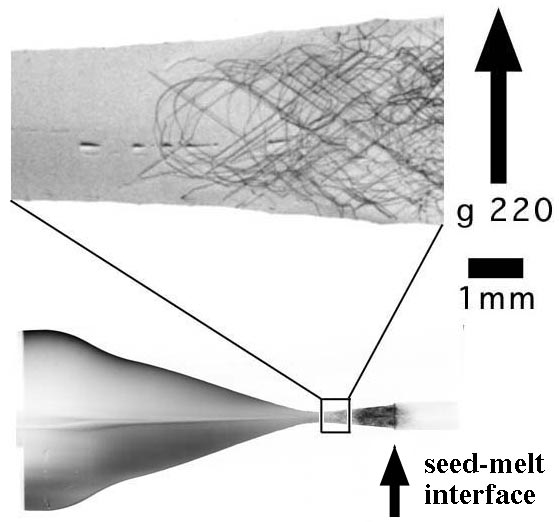High energy x-ray topography of silicon crystal ingots
問い合わせ番号
SOL-0000001109
ビームライン
BL20B2(医学・イメージングI)
学術利用キーワード
| A. 試料 | 無機材料 |
|---|---|
| B. 試料詳細 | 半導体, 結晶性固体, 結晶 |
| C. 手法 | X線回折 |
| D. 手法の詳細 | 反射、屈折 |
| E. 付加的測定条件 | 界面, 室温 |
| F. エネルギー領域 | X線(4~40 keV), X線(>40 keV) |
| G. 目的・欲しい情報 | 欠陥、転位、歪み |
産業利用キーワード
| 階層1 | 半導体 |
|---|---|
| 階層2 | シリコン系半導体 |
| 階層3 | SOI,基板 |
| 階層4 | 表面・界面, 格子定数, 亀裂、空隙, 形態 |
| 階層5 | 回折 |
分類
A80.10 エレクトロニクス, A80.30 無機材料, M10.80 歪み解析
利用事例本文
High energy (short wave length) x-ray topography is a powerful technique to visualize imperfection or inhomogeneity in a bulk crystal or a crystal containing heavy elements in a transmission geometry. Using this technique, one can observe lattice defects in a crystal ingot without any sample preparations such as cutting and slicing. The figure shows the 220 reflection traverse topograph of a 2 inches-diameter as-grown CZ-silicon crystal ingot. This topograph reveals the dislocation formation at the seed-melt interface and the dislocation termination during the necking process.
[ Y. Shikaura, S. Iida, S. Kawado, K. Mizuno, S. Kimura, J. Matsui, M. Umeto, T. Ozaki, T. Shimura, Y. Suzuki, K. Izumi, K. Kawasaki, K. Kajiwara and T. Ishikawa, Journal of Physics D 34, A158-A162 (2001), Fig. 6,
©2001 Institute of Physics and IOP Publishing, Ltd. ]
画像ファイルの出典
原著論文/解説記事
誌名
Y. Chikaura, S. Iida et al, J. Phys. D: Appl. Phys. 34 (2001) A158-A162.
図番号
測定手法
画像ファイルの出典
図なし
測定準備に必要なおおよその時間
2 シフト
測定装置
参考文献
| 文献名 |
|---|
| Y. Chikaura, S. Iida et al, J. Phys. D: Appl. Phys. 34 (2001) A158-A162. |
関連する手法
アンケート
SPring-8だからできた測定。他の施設では不可能もしくは難しい
本ビームラインの主力装置を使っている
測定の難易度
中程度
データ解析の難易度
初心者でもOK
図に示した全てのデータを取るのにかかったシフト数
2~3シフト


